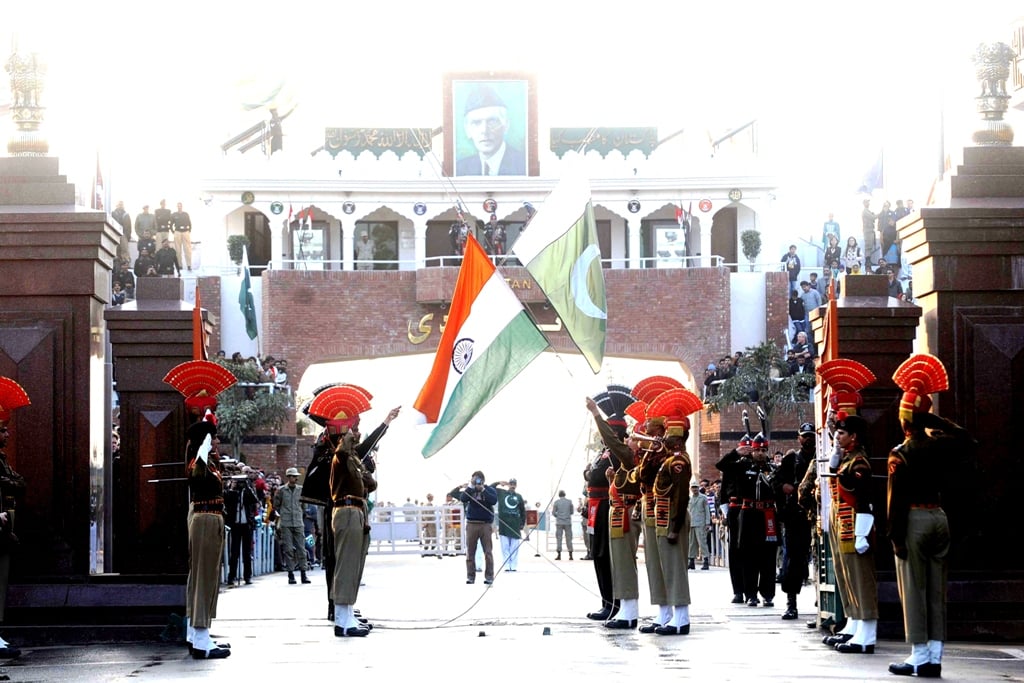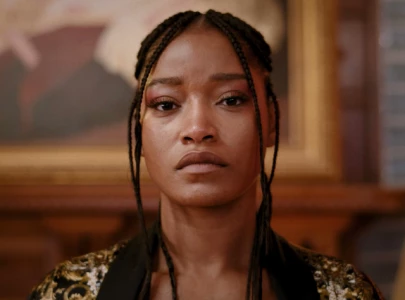
The visa regime – agreed upon by Pakistan and Indian governments last September - was due to be implemented in mid-January. It would have allowed senior Pakistani citizens of over 65 years of age to get a single entry 'visa-on-arrival' (VoA) at the Attari, Wagah checkpost. The visa would be valid for 45 days.
However, as tensions boiled on the Line of Control in which soldiers on both sides were killed in early January, India unilaterally decided not to implement the regime.
At the time Indian officials explained that the operationalisation of the VoA was delayed as several security agencies had sought clarifications on facilities to be offered to the Pakistani citizens without Indian sponsors.
COMMENTS (17)
Comments are moderated and generally will be posted if they are on-topic and not abusive.
For more information, please see our Comments FAQ


1672385156-0/Andrew-Tate-(1)1672385156-0-165x106.webp)














@Naveen Reciprocity is not a prerequisite. This is about being human. India being bigger can afford to be a bit more generous on these small issues.
Agree completely. But people like you (and me) are in the minority, atleast among the netizens. A large section of upwardly mobile Indian yuppies look at the state as a corporate monolith, as if it's performance should be measured in terms of profit/loss and it has to be visible and instant. If reciprocity has an appearence of loss, shun it. Grab it, even if it brings no profit but an equivalence in negativity. This happens when one wants to become like one’s “enemy”. They may not admit it in public, but secretly they admire the "enemy"s ability to create mischief. India doesn't have to be generous per say, in foreign policy matters no one is. But India needs to be sagacious.
ET Please allow. Am responding to someone who has made many incorrect assumptions abot my thought process. @Hasan Mehmood: "ny neutral observer can confirm the self righteous strain in your comments implying all is well with India and all is wrong with Pakistan "
I comment on individual blogs on their merit. This being a Pakistani newspaper, many stories I comment here relate to Pakistan. I am certainly not of the opinion that everything is right with India. Whether female foeticide, or widespread hunger or open defecation - India has many big challenges. They just happen to be different challenges from the ones that Pakistan faces. So you have assumed how I feel but it is not accurate.
"For someone wanting Pakistanis to be kept at arm’s length you have the highest number of comments on each and every Pakistani issue irrespective of relevance to INDIA. "
In this blog, I was not saying keep Pakistanis away. I was simply saying concessions should be reciprocal. The 2 statements are quite different. In any case I was born and raised in Mumbai where my parents live even today and the reason I started reading Pakistani newspapers AFTER 26/11 is to understand what would drive people to do what they did. So in a sense my wariness of Pakistan and my interest in Pakistan are directly connected. Again it is Pakistani state institutions I am wary of not individual Pakistanis - many of whom I count as friends here in the US.
@Gp65: @Hasan Mehmood:
ET: Please allow the following since it has information that may interest many:
Indian gesture falls under Diffuse form of Reciprocity in Diplomacy where perfect Equivalence is not mandatory.Robert Keohane, political scientist, professor at Harvard & winner of Harvard Centennial Medal mentions of two kinds of Reciprocity viz, Specific & Diffuse. In case of Specific Reciprocity (Quote): "partners exchange items of equivalent value in a delimited time sequence whereas Diffuse Reciprocity implies less precise definitions of equivalence and less narrowly bounded time sequences. Diffuse reciprocity implies that the parties do not insist on immediate and exactly equivalent reciprocation of each and every concession, on an appropriate “quid” for every “quo”.:(Unquote) Indian Diplomats are well trained & they sure do not need a lesson in their trade craft to cultivate "sense of equivalence". They understand the subtleties involved in a gesture which is made keeping certain long term strategies in mind. The Master says again, & this is worth a re-read: (Quote)" To the extent that diplomatic interaction comes close to the pole of Diffuse reciprocity, conflict resolution becomes easier. Conversely, insistence on Specific reciprocity often makes it more difficult.":(Unquote)
@Gp65: For someone with an educated / rational mind your comments are getting boringly predictive. For someone wanting Pakistanis to be kept at arm's length you have the highest number of comments on each and every Pakistani issue irrespective of relevance to INDIA. (I am not referring to this blog). Any neutral observer can confirm the self righteous strain in your comments implying all is well with India and all is wrong with Pakistan (though I agree much is wrong with Pakistan at the moment). Coming back to reciprocity, till now the most significant concession has been made by Pakistan in mutual relations. We have after decades of KASHMIR FIRST policy, opted for composite dialogue. We have officially disowned (in Musharaf era) the freedom fighters. We have shown readiness to solve Kashmir issue by adopting any solution short of plebiscite / independence. This in spite of a very hawkish / influential lobby in Pakistan. Does Indian foreign office shown a similar fundamental shift in any issue. In fact you have failed to address a small benign issue of Sir Creek. Coming back to composite dialogue, pick up any Indian newspaper in 1970s and 1980s. In response to Pakistani demand to settle Kashmir issue there was a constant refrain of first concentrating on CBMs like trade / travel / tourism / exchange of books / reciprocatory visits of artists / writers etc and so on. We were also constantly reminded of common roots so much so that a large proportion of Pakistanis felt that India has not accepted Pakistani nation and wants to make a Akhand Bharat. To retain intellectual credibility one must try to be a bit fair (being totally fair is not possible due to deep rooted bias based on nationality). Even in the case of Israel and Palestine, one cannot say that Israel is 100% wrong and Palestine people are 100% right. PEACE
@ Hasan Mehmood ; Indian Diplomats and MEA should simply drop this game of Reciprocity . Other than keeping an eye on Terrorrists, India should treat the Pak Citizens as it deals with Bhutan and Napal Citizens, always free to come and free to go, free to study in Indian Institutions, free to work and marry here no questions asked.. For Pak establishment, is like a Person possessed by Jins and Bhoots and non state actors. It has no control over its Functions and Actions. No sane person reciprocates a Man possessed by demons. When a soldier was beheaded, India did the normal thing by closing the Door to keep out the bad siprit.That is how it is in real life. Let us make our transactions like normal people, for bad siprits do inflict damage but life goes on for thousands of years ,but good deeds do survive.
@Hasan Mehmood: Why should Pakistan not offer reciprocity? What does India being bigger have to do with it and why does the expectation of reciprocity amount to an accusation of trolling?
Also this India is bigger brother statement is very selective. It only comes up when unilateral concessions are sought. Someohow at other times there are chest thumping statements of we will not permit a chaudhry in the region. You want to be treated as equl? Fair enough. Why not act as an equal then?
@Rakib : you have exceptional command over language so I do not believe that you are not aware that this is not one of he situations where you can talk about 'false equivalence'.
You may feel Pakistanis are our brothers. I do not and most Indians do not. I think they are neighbors and as long as we can live as good neighbors respecting each other I am fine. I do not consider Pakistan a younger sibling to whom I should continue to make unilateral concessions.
@Naveen: {India being bigger can afford to be a bit more generous on these small issues} Why this simple fact is totally ignored by Indian trolls.
Good step. As somebody on this page has already suggested, we should extend it for the Pakistani patients and I would say even little kids upto 10-12 years (if that isn't already so). Kids are even more important, as they are the future and it would be in our interest if they see real India and real Indians, instead of relying on their school textbooks and internet keyboard warriors.
Reciprocity is not a prerequisite. This is about being human. India being bigger can afford to be a bit more generous on these small issues.
@gp65: [But not reciprocated by Pakistan like many other things e.g. MFN]
The oft repeated phrase here-"false sense of equivalence" translates in my book as never wanting to seek reciprocity in doing things that one believes to be intrinsically & humanely correct. This may go against the textbook of external affairs ministry, of course! Accentuating differences & being different are two different things. I would rather India be genuinely different like in this case or as she has been in case of MFN. Being so is good if the claims of being lofty vis-a-vis the lowly are to be made credible, & the hyphenation prevented; regardless of ritualistic dance of diplomats who seek parity even while highlighting disparity.
@Asif Butt: The pooja meghwal chain reaction, I suppose …. Nah,we dont take such a short sighted decision.
@Rakib:I have no issue with this visa regime and infact it was long overdue.But, Mr Rakib we hindu indian also expect something in return.How about MFN status to India , safety of Hindus in pakistan,and curve on export of terrorism?
@Rakib: "A humane gesture that was long overdue. "
But not reciprocated by Pakistan like many other things e.g. MFN.
@Babloo Come and see the specialty Hospitals, you will find lot of Pakistani patients taking medical treatment for Liver, Heart, Kidney transplants and complex surgeries. However Indian government should always grant visa for patients. There should on arrival visa arrangement for Pakistani patients. Its Humanity
Gulam Rasool"Kuldeep sharma" New Delhi
A humane gesture that was long overdue. Politicians, sportsmen & actors must be a small percentage of the visa seekers. Bulk of the visitors (both ways) may be members of split families & pilgrims to holy places. May be, a small number of 65+ also be the nostalgia driven ones wanting to recapture something that they or their elders left behind & clinging with a hopeless hope, which only the elderly can nurture, for a last glimpse of the sepia-tinted past, looking for a lane here, a town-square there, a school or a neighbour, all seeking their own heirloom of memories. They are a vanishing lot & deserve some consideration.. Reality that they may encounter will be different but they are entitled to their disappointments too.
The pooja meghwal chain reaction, I suppose ....
@Babloo: While senior citizens of Pakistan may have a legitimate reason to visit India for family and other personal ties, the lesson learnt from this episode is that one act of terror can freeze all aspects of bilateral ties and the persons to suffer are the civilians. Despite the sympathies for senior citizens, the general view in India is that Pakistanis (be it politicians, sports performers, actors and others) should not be allowed to come to India, let alone granting them a visa on arrival facility. Indians would not feel bad if Pakistan introduced a reciprocal system of denying visas to Indian visitors who are, anyway, not interested in visiting that country, as many opinion polls confirm.
So Pakistanis 65 years of age and above can just walk up to the VISA counter at Attari check-post and get a VISA for India ? Is that paradise or what ?
What about senior Indian citizens of India wanting to visit Pakistan ?
No, just like MNF status, Pakistan has not reciprocated Indian gesture.